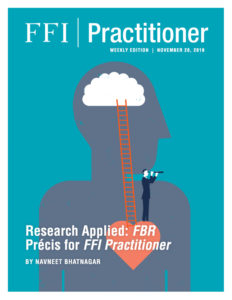
View this edition in our enhanced digital edition format with supporting visual insight and information.
Thank you to this week’s contributor, Navneet Bhatnagar of the FBR Research Applied Board, for sharing his précis of “Listening to the Heart or the Head? Exploring the “Willingness Versus Ability” Succession Dilemma” – an article that appears in the December 2019 issue of FBR. In the article, Navneet provides a summary of the research and key findings, as well as exploring the practical implications of the research for families, advisors, and researchers in the field.
Leadership succession is critical to family businesses because it determines their long-term future. Incumbent leaders seek a successor from the family who has high levels of commitment (i.e., willingness) and competence (i.e., ability). However, the potential candidates may often score high only on one of these attributes. Therefore, the incumbent leader is forced to make a trade-off while selecting the successor. Existing knowledge is unable to predict which of these two successor attributes is more desirable. Family business researchers Melanie Richards, Nadine Kammerlander, and Thomas Zellweger aim to address that knowledge gap in this study. Using 1,060 survey responses from family owner-managers of small and mid-sized family firms, this research examines whether incumbent leaders favor competence or commitment while selecting their successor.
Quest for the Ideal Successor
Succession is the transfer of leadership responsibility, which is one of the most critical events in the life cycle of a family business. This transition is often intergenerational, may take several years, and requires careful planning and implementation. One of the most significant decisions in the succession process is the selection of a successor. The incumbents often prefer to have a family successor, namely their offspring, to ensure continuity in family legacy and control over the business. However, in addition to family membership the incumbent also aims to ensure that the potential successor has the ability and willingness to manage and lead the business. Ability is essential since the successor’s competence to run the business is critical to its future prosperity. Further, the successor’s commitment to lead the family business determines how motivated, willing, and attached s/he is, to lead the business for a long time period, thereby ensuring continuity of family legacy. Thus, the ideal successor sought by the incumbent is someone who is a competent and committed family member.
Institutional Logics and Succession Dilemma
Given the requirements for a potential successor, finding the ‘right’ candidate with high levels of both, commitment and competence, is quite challenging. This is so because the family pool remains limited. Competences are often imperfectly inherited by later generation members. Commitment to continue the family business also comes down since more attractive career opportunities become available outside. Therefore, the incumbent’s choices often become restricted to family members who have high levels of competence or commitment. Non-substitutable nature of these attributes further complicates the challenge of successor selection. Thus the incumbent is faced with an ability and willingness dilemma while selecting the successor.
Societal institutions such as corporations or families engender different logics based on which individual role identities and objectives are formulated. Corporate logic emphasizes merit, growth, profit, firm size, and market position. Family logic emphasizes the notion of community, unconditional loyalty to family members, family reputation, honor, and security. Corporate and family logics are often contradictory. Based on their professional experience, individuals are either promoters or opponents of a logic. They can even combine rival institutional logics since they may have diverging role identities such as, being a family leader as well as the CEO of the firm. The role identity that gets activated in a situation depends on the individual’s attention to a particular logic. The attention is shaped by accessibility of logic (familiarity) and situational stimuli (concerning situations). The authors conducted a survey and analyzed data to identify how the incumbents solved the successor ability and willingness dilemma.
Key Findings
Based on statistical data analysis the authors found the following:
- If a family firm has a large number of family members in management or high cultural embeddedness, then the incumbent assigns more importance to keeping the family together in the future and is likely to select a successor with high levels of commitment (willingness) even if s/he is a less competent candidate.
- On the other hand, if the incumbent has had external professional work experience or higher levels of education or firm performance that is below their aspirations, then they are likely to assign more importance to the successor’s business acumen and select a successor with high level of competence (ability) even if s/he is a less committed candidate.
Readers interested to know more about the research design and the specific measures that the authors analyzed, are advised to refer to the ‘Method’ section of this paper.
Implications of the Study
For Research
- The study extends family business succession research by suggesting that the incumbent’s resolution of successor ability and willingness dilemma depends on the dominant institutional influence. Successor competence becomes the main criterion in successor selection when business considerations take precedence. However, in certain cultural contexts family considerations may prevail and commitment to the family business may become the basis for successor selection.
- The study extends our knowledge of institutional logics by exploring micro-level sense-making in the context of family business successor selection. It reveals how individuals solve predicaments that incorporate rival institutional (i.e., family and corporate) logics.
For Family Firms
- Discussion on key criteria and underlying logic for successor selection would help the incumbent leader to communicate and convince other family members on the objectivity and rationale of the process. Such discussion would facilitate an exchange of opinions held by different family members and make successor selection more transparent, participative, just, and acceptable.
- Family firm management need not always give preference to business logic and choose the most capable successor. Instead, they can assign more importance to family logic and choose a successor who has a higher level of commitment to the family business though s/he may not be the most capable member. However, the candidate’s loyalty and dedication to the family are likely to ensure continued family harmony and business sustenance.
For Advisors
- Practitioners can identify the factors that influence the incumbent leader’s choice in situations involving a trade-off between the successor’s competence and commitment. Advisors can facilitate a discussion on those issues and uncover subconscious biases, which if left unaddressed, can lead to friction in the family.
- Family business advisors can offer systematic guidance to their clients on how to evaluate the suitability of a successor candidate. When they guide the incumbent leader, the advisors need to be mindful of the family objectives of ensuring harmony and continuity.
- While offering advice on successor selection, it is important for the advisor to understand that a successor’s competence can be built through executive coaching and training. However, successor commitment is very difficult to change through external intervention.
About the Contributor
 Navneet Bhatnagar, PhD, CFBAis Senior Researcher at the Thomas Schmidheiny Centre for Family Enterprise, Indian School of Business, in Hyderabad, India. He can be reached at Navneet_Bhatnagar@isb.edu.
Navneet Bhatnagar, PhD, CFBAis Senior Researcher at the Thomas Schmidheiny Centre for Family Enterprise, Indian School of Business, in Hyderabad, India. He can be reached at Navneet_Bhatnagar@isb.edu.
About the Thomas Schmidheiny Centre for Family Enterprise, Indian School of Business
The Thomas Schmidheiny Centre for Family Enterprise was launched in 2015 with an aim to advance real-world and academic knowledge of family business. Since its inception, the Centre has been bringing together faculty and practitioners from India and abroad with the broad aim of combining theory and practice to enhance research and innovation in the field.

View this edition in our enhanced digital edition format with supporting visual insight and information.





